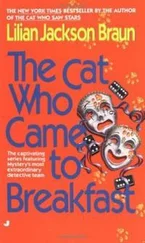There were six windows that required watching, for a wide ledge ran around the building flush with the tenth-floor windowsills, and this was a promenade for pigeons. They strutted, searched their feathers, and ignored the Madame, who sat on the sill and watched them dispassionately but thoroughly through the window screen.
While watching was a daytime job, listening was done after dark, requiring greater concentration. Madame Phloi listened for noises in the walls. She heard termites chewing, pipes sweating, and sometimes the ancient plaster cracking, but mostly she listened to the ghosts of generations of deceased mice.
One evening, shortly after the incident in the elevator, Madame Phloi was listening. Thapthim was sleeping, and the other two were quietly turning pages of books, when a strange and horrendous sound came from the wall. The Madame’s ears flicked to attention, then flattened against her head.
An interminable screech was coming out of that wall, like nothing the Madame had ever heard. It chilled the blood and tortured the ears. So painful was the shrillness that Madame Phloi threw back her head and complained with a piercing howl of her own. The strident din even waked Thapthim. He looked about in alarm, shook his head wildly, and clawed at his ears to get rid of the offending noise.
The others heard it, too.
“Listen to that!” said the one with the gentle voice.
“It must be the new man next door,” said the other. “It’s incredible!”
“How could anyone so crude produce anything so exquisite? Is it Prokofiev he’s playing?”
“I think it’s Bartók.”
“He was carrying his violin in the elevator today. He tried to hit Phloi with it.”
“He’s a nut . . . . Look at the cats! Apparently they don’t care for violin music.”
Madame Phloi and Thapthim, bounding from the room, collided with each other in a rush to hide under the bed.
That was not the only noise emanating from the next-door apartment in those upsetting days after the fat man moved in. The following evening, when Madame Phloi walked into the living room to commence her listening, she heard a fluttering sound dimly through the wall, accompanied by highly conversational chirping. This was agreeable music, and she settled down on the sofa to enjoy it, tucking her brown paws neatly under her creamy body.
Her contentment was soon disturbed, however, by a slamming door and then the fat man’s voice bursting through the wall like thunder.
“Look what you done, you dirty skunk!” he bellowed. “Right in my fiddle! Get back in your cage before I brain you!”
There was a frantic beating of wings.
“ GET down off that window or I’ll bash your head in!”
The threat brought a torrent of chirping.
“Shut up, you stupid cluck! Shut up and get back in that cage or I’ll . . .”
There was a splintering crash, and then all was quiet except for an occasional pitiful “peep!”
Madame Phloi was fascinated. In fact, when she resumed her watching chore the next day, pigeons seemed rather insipid entertainment. Thapthim was asleep, and the others had left for the day, but not before opening the window and placing a small cushion on the chilly marble sill.
There she sat, a small but alert package of fur, sniffing the welcome summer air, seeing all and knowing all. She knew, for example, that the person walking down the tenth-floor hallway, wearing old tennis shoes and limping slightly, would halt at the door, set down his pail, and let himself in with a passkey.
Indeed, she hardly bothered to turn her head when the window washer entered. He was one of her regular court of admirers. His odor was friendly, although it suggested damp basements and floor mops, and he talked sensibly; there was none of that falsetto foolishness with which some persons insulted the Madame’s intelligence.
“Hop down, kitty,” he said in a musical voice. “Charlie’s gotta take out that screen. See, I brought some cheese for the pretty kitty.”
He held out a modest offering of rat cheese, and Madame Phloi investigated it and found it was the wrong variety, and she shook one fastidious paw at it.
“Mighty fussy cat,” Charlie laughed. “Well, now, you sit there and watch Charlie clean this here window. Don’t you go jumpin’ out on the ledge, ‘cause Charlie ain’t runnin’ after you. No sir! That old ledge, she’s startin’ to crumble. Someday them pigeons’ll stamp their feet hard, and down she goes! . . . Hey, lookit the broken glass out here! Somebody busted a window.”
Charlie sat on the marble sill and pulled the upper sash down in his lap, and while Madame Phloi followed his movements carefully, Thapthim sauntered into the room, yawning and stretching, and swallowed the cheese.
“Now Charlie puts the screen back in, and you two guys can watch them crazy pigeons some more. This screen, she’s comin’ apart, too. Whole buildin’s crackin’ up.”
Remembering to replace the cushion on the cool, hard sill, he went on to clean the remaining windows, and the Madame resumed her post, sitting on the edge of the cushion so that Thapthim could have most of it.
The pigeons were late that morning, probably frightened away by the window washer. When the first visitor skimmed in on a blue gray wing, Madame Phloi first noticed the tiny opening in the screen. Every aperture, no matter how small, was a temptation; she had to prove she could wriggle through any tight space, whether there was a good reason or not.
She waited until Charlie had limped out of the apartment before she started pushing at the screen with her nose, first gingerly, then stubbornly. Inch by inch the rusted mesh ripped away from the frame until the whole corner formed a loose flap. Then Madame Phloi slithered through—nose and ears, slender shoulders, dainty Queen Anne forefeet, svelte torso, lean flanks, hind legs like steel springs, and finally proud brown tail. For the first time in her life she found herself on the pigeon promenade. She shuddered deliciously.
Inside the screen the lethargic Thapthim, jolted by this strange turn of affairs, watched his daring parent with a quarter inch of his pink tongue protruding. They touched noses briefly through the screen, and the Madame proceeded to explore. She advanced cautiously and with mincing step, for the pigeons had not been tidy in their habits.
The ledge was about two feet wide. Moving warily, Madame Phloi advanced to its edge, nose down and tail high. Ten stories below there were moving objects but nothing of interest, she decided. She walked daintily along the extreme edge to avoid the broken glass, venturing in the direction of the fat man’s apartment, impelled by some half-forgotten curiosity.
His window stood open and unscreened, and Madame Phloi peered in politely. There, sprawled on the floor, lay the fat man himself, snorting and heaving his immense paunch in a kind of rhythm. It always alarmed her to see a human on the floor, which she considered feline domain. She licked her nose apprehensively and stared at him with enormous eyes. In a dark corner of the room something fluttered and squawked, and the fat man opened his eyes.
“SHcrrff! GET out of here!” he shouted, struggling to his feet and shaking his fist at the window.
In three leaps Madame Phloi crossed the ledge back to her own window and pushed through the screen to safety. After looking back to see if the fat man might be chasing her and being reassured that he was not, she washed Thapthim’s ears and her own paws and sat down to wait for pigeons.
Like any normal cat Madame Phloi lived by the Rule of Three. She resisted any innovation three times before accepting it, tackled an obstacle three times before giving up, and tried each activity three times before tiring of it. Consequently she made two more sallies to the pigeon promenade and eventually convinced Thapthim to join her.
Читать дальше












